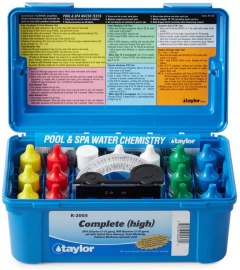
A comprehensive kit that has everything you need to test the water in your home swimming pool or spa.
A comprehensive kit that has everything you need to test the water in your home swimming pool or spa.
An accurate test kit with enough reagents to last you for an entire season. The kit can test free and total chlorine, bromine, pH, alkalinity, cyanuric acid, and calcium hardness. There is a reference chart in the lid of the case to remind you how to perform each test.
The kit is comprehensive and therefore requires a bit of knowledge to use effectively.
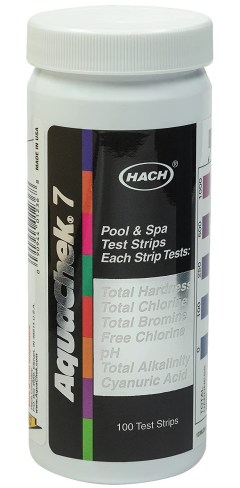
A container with 100 test strips that can quickly provide a comprehensive snapshot of your pool water chemistry.
A container with 100 test strips that can quickly provide a comprehensive snapshot of your pool water chemistry.
These easy-to-use strips test for all the essentials: free and total chlorine, bromine, pH, alkalinity, cyanuric acid, and calcium hardness. The container comes with enough strips to get the average homeowner through an entire season.
Be sure to follow all directions or your tests will not produce accurate results.
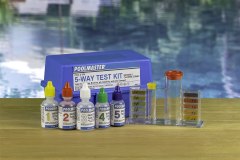
A home swimming pool and spa water test kit that features numbered reagent bottles to make testing your water easier.
A home swimming pool and spa water test kit that features numbered reagent bottles to make testing your water easier.
This kit comes in a durable case and can test for chlorine, bromine, pH, acid demand, and total alkalinity. The color chips are UV protected and imbedded within the polyethylene test block to help ensure that the colors never fade.
Be sure to carefully follow the instructions for each test in order to achieve accurate results.
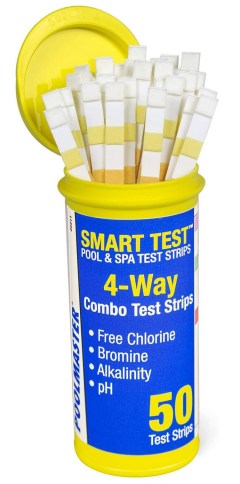
A cost-effective way to quickly check the three levels most needed to maintain your water balance in a home pool or spa.
A cost-effective way to quickly check the three levels most needed to maintain your water balance in a home pool or spa.
A cost-effective way to quickly check the three levels most needed to maintain the water balance in a home pool or spa. The no-bleed test pads produce a uniform color to help increase accuracy. Since there are only three items to consider, the test isn't overly complicated.
It can take a little bit of practice to match the test strip colors to the chart. You also might need two containers to get through the summer.
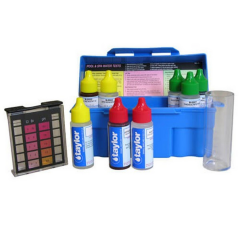
An affordably priced home swimming pool and spa water testing kit that can help you troubleshoot chemical balance issues.
An affordably priced home swimming pool and spa water testing kit that can help you troubleshoot chemical balance issues.
This handy kit can test free and total chlorine, bromine, pH, acid demand, and total alkalinity. The instruction card can serve as a quick reference if you forget any of the testing procedures. The kit also comes with a dosage chart so you know how to balance your water after taking a reading.
This testing kit may require a brief learning period to get the most out of it.

We recommend these products based on an intensive research process that's designed to cut through the noise and find the top products in this space. Guided by experts, we spend hours looking into the factors that matter, to bring you these selections.

If you've ever seen a pond covered with algae and swarming with mosquitoes, you know how important it is to maintain healthy water in your swimming pool. If left unchecked, pool water can quickly turn your dream into a nightmare. In order to be sure your backyard oasis stays swimmable, you need a pool water test kit.
The best pool water test kits are easy to use and produce consistently accurate results. Although there are only a few essential tests you need to perform routinely, a pool water test kit that can provide you with a more in-depth analysis of your water is a better option.

Purchasing a pool water test kit may seem like a daunting task, but it's actually fairly easy once you know what to look for in a quality kit. For instance, there are only three types of test kits you need to consider. The best one for you will be determined by your preference. There are pros and cons to each type, but no right or wrong choices.
Test strips
These thin white strips have a number of treated squares on them. Some have just three, while others may have as many as six. Each square performs a different test, and you can see the results in seconds. You simply match the color on the chart – which is usually located on the container – and you've got a good idea of what is going on with your pool water.
The downside to these strips is they can be easily contaminated. Just reaching in the container with wet hands can ruin most of the pack, so you must be careful. Also, not following the directions precisely may produce erroneous readings.
Test kits
These kits typically come with two little polyethylene containers and a number of tiny plastic bottles filled with reagents – depending on the kit, you may have two or several reagents. You use the container to take samples of the pool water. After filling the container to the proper level and adding the precise amount of drops, you swirl the water and the reagent together until you get a uniform color. Then, you match this color to the chart, which is also on the polyethylene container, and that is how you obtain your reading.
The major drawback to this method is it is time consuming, especially if you need to perform more than one test. Additionally, the colors are fairly close in hue and it can sometimes be difficult to interpret your actual reading.
Digital testers
The obvious upside to digital pool water testing kits is you get a reading like 7.2, so you can see exactly how much chlorine is in your water. However, you must be careful because some digital testers perform tests you don't necessarily need for pool water – many are designed for testing your drinking water.
There are two main types of digital water testers. The first type allows you to simply stick probes into the water to get results, while the other models still require you to mix together the pool water and a reagent. These types of pool water test kits are at the higher end of the price range, so if budget is a concern, the other two options may make more sense.
You need to keep close tabs on the chlorine/bromine levels and your pool water's pH. Those are the essential tests you must perform regularly. There are a number of other tests that you can perform to better understand your pool water chemistry. These tests can help you save a great deal of money if you need to troubleshoot certain conditions. Not all kits offer all tests. The following are your options.
● Free chlorine: This is what keeps your pool sanitized. You want to keep the level between 1 and 3 parts per million (ppm).
● Total chlorine: After chlorine has done its job of sanitizing, it is still in the water, but it is essentially ineffective. This type of chlorine is called combined chlorine. Total chlorine is both the active and the non active chlorine in your pool water. When the pool starts to smell or your eyes get irritated, it usually means there is too much combined chlorine and you will need to shock it/super chlorinate it to get rid of the combined chlorine.
● Bromine: This is an alternative to chlorine. It holds up better in warmer water, making it more effective for spas. You want to keep the level between 3 and 5 ppm.
● pH: This number tells you how acidic your pool water is. The typical level for the human body is around 7.4. The lower the number, the higher the acidity. The pH of swimming pool water should be between 7.4 to 7.6 to provide the most comfort .
● Acid demand: This test helps you determine how much acid is needed to lower the pH level of your pool water.
● Base demand: This test helps you determine how much of an alkaline (base) substance is needed to raise the pH level of your pool water.
● Total alkalinity: Alkalinity is related to, but not the same as, pH. It can best be thought of as the water's resistance to change, specifically to become more acidic. In swimming pool water tests, the focus is on bicarbonate alkalinity. This reading should be between 80 ppm and 120 ppm.
● Calcium hardness: This test measures the amount of calcium in your pool water. When the reading is too high, the water is typically cloudy and the filters clog more frequently. When it is too low, you may notice pitting and dissolving of concrete, plaster, and grout. The ideal range is 200 to 400 ppm in pools and 150 to 250 ppm in spas.
● Cyanuric acid: Cyanuric acid helps the chemicals in your pool water work more effectively, thus saving you money. The lower the cyanuric acid, the more chlorine you will use. Aim for 50 ppm.
● Total dissolved solids: This test measures everything that is dissolved in your pool water. Drinking water can only have 500 ppm according to EPA Water Standards. Pool water is best if kept below 1,500 ppm. It is possible to maintain much higher levels if the water is properly balanced, but this lower level is best for combating salty water, stains, cloudy water, and scaling (buildup).
● Salt: If you have a saltwater pool, you'll want to keep the salt level to the manufacturer’s recommended range. This test will help you do that.
● Temperature: Most pool water test kits do not come with a thermometer, but water temperature is actually a crucial factor in determining how to balance your pool water. It is important to purchase a pool thermometer if you want to perform certain calculations.

The cost of testing kits for your home swimming pool and spa may vary greatly depending on which type of kit you purchase.
Inexpensive
A canister of 50 test strips that you dip into the water to get an instant reading of chlorine and pH will cost between $8 and $10. From $12 to $15, you will find more comprehensive test strips and some basic digital testers with limited functions.
Mid-range
In the $15 to $20 range is where you'll find test kits that come in a case and require you to mix reagents with pool water to perform basic tests. In this range, you will also find 100 count strips that provide a comprehensive snapshot of your pool water chemistry. Better digital testers are located in the $20 to $30 price range, while kits that contain enough reagents for an entire season can cost between $30 and $60.
Expensive
Usually, pool water test kits that cost over $100 will be more than you need for a home pool. However, if budget isn't a concern, you use your pool a lot and find that results from your tests change quickly, that may be what you prefer.
No matter which pool water test kit you purchase, its accuracy can be diminished by contamination or improper usage. Here are some tips for getting the best results from your pool water testing kit.
● Be regular: It is recommended that you check your pool water a minimum of two times per week. Do not do any less. Daily tests are better to catch any problems early. By comparison, commercial pools should be tested every hour.
● Mornings are best: If you want the best representation of how your pool is functioning, test your water in the morning after your pool has had a chance to recover from the previous day.
● Understand your limits: Consult your test kit to learn what the proper levels should be.
● Both ends: If you have a deep and a shallow end, be sure to test both to make sure the readings are acceptable at each end.
● Expiration dates: Yes, your pool water test kit has an expiration date. Check to make sure your kit is still good, especially at the start of swimming season if you haven’t used it in a while.
● Follow all directions: If you do not follow the directions, you will not get accurate readings.
● Test first: Test before adding additional chemicals.
● Be patient: Some chemicals may take up to 24 hours to deliver their full effect. Testing too soon after adding chemicals may give you false readings and cause you to add more chemicals than you need.
● White background: When matching colors, it is best to compare them against a white background.
● Check your results: Many pool service stores offer free in-store water testing. To make sure you are getting accurate readings from your home pool water test kit, take advantage of this service.

Q. What is the difference between chlorine and bromine?
A. Chlorine and bromine both work to sanitize your water by killing bacteria and other harmful contaminants. The main differences are that bromine is more beneficial to individuals with sensitive skin and it is more stable at warmer temperatures than chlorine. Because of this, bromine is often the better choice to treat spa water. Testing kits typically test for both chlorine and bromine, but always check the label to be sure as some may require additional calculations.
Q. Do I need a different type of test kit for a saltwater pool?
A. A saltwater pool still uses chlorine to sanitize the water, the only difference is a saltwater chlorine generator (SWG) converts the salt to chlorine via electricity. All the regular pool water test kits will work fine as the numbers are the same no matter which type of pool you have. However, it is important to adjust the salt level to the manufacturer’s recommended range. In order to measure that, you will need a kit or separate strips that can test your pool water for sodium chloride content.
Q. Which is better, test strips or kits with liquid reagents?
A. There is always going to be a debate over which method of testing is better. Mostly, it comes down to contamination, following the directions, and personal preference. Test strips are extremely convenient, offering everything you need in a matter of seconds. Because of this, you will more likely perform regular testing with strips. However, individuals who work around pools daily will often point out that the extra time it takes to perform the individual drop tests is worth it for the increased accuracy. The best method is to test more frequently with strips, but also perform backup tests with a kit a minimum of two times a week to be sure both readings are in alignment.
Get emails you’ll love.
Learn about the products you’re wondering if you should buy and get advice on using your latest purchases.
